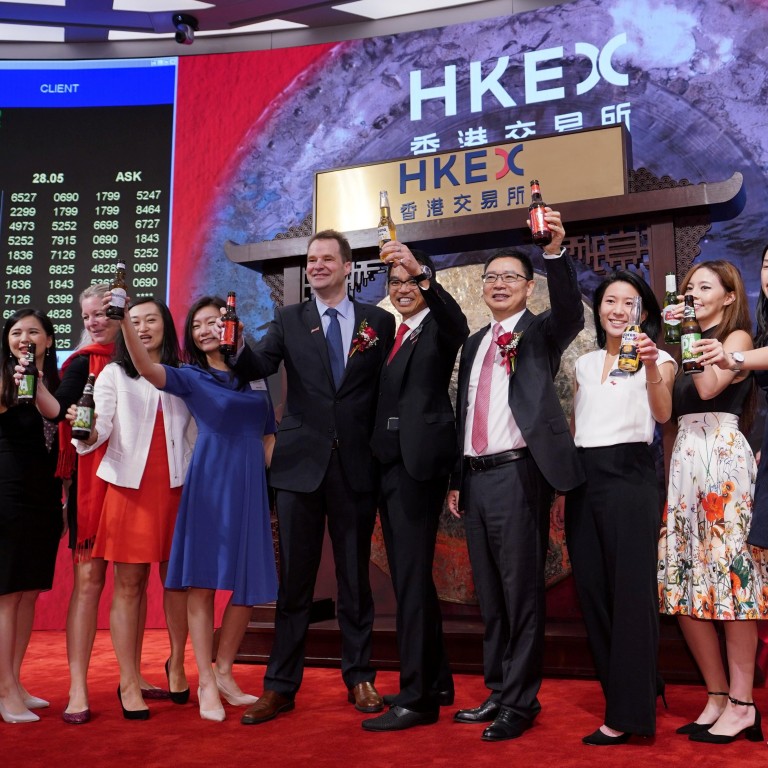
Hong Kong beats Nasdaq to IPO crown as Alibaba, Budweiser mega listings lift funds raised to US$40 billion for 2019
- The Hong Kong stock exchange shot ahead of Nasdaq thanks to Alibaba’s mega listing in November, which raised US$12.9 billion
- Outlook for 2020 is good, say analysts, as Alibaba’s performance since debut, and a breakthrough in US-China trade talks attract more listings
Hong Kong has again taken the crown as the world’s largest initial public offering market worldwide.
The mega listing of Alibaba Group Holding in November pushed it to the top of the league for the seventh times in 11 years, according to data from Refinitiv.
Some 144 companies have raised US$40 billion on the main board of the Hong Kong stock exchange this year, as of December 26, 8.7 per cent higher than the US$36.8 billion raised in 2018. It is the highest amount raised in a single year since 2010.
Besides Alibaba, Hong Kong’s main board also attracted Budweiser Brewing Co APAC, the Asia-Pacific arm of Anheuser-Busch InBev, the world’s largest brewer. The beer maker raised US$5.7 billion in the fourth largest IPO worldwide this year.
The two blockbuster listings allowed Hong Kong to jump ahead of Nasdaq, in second place, which raised US$27.5 billion. Nasdaq attracted listings including ride-hailing company Lyft’s IPO of US$2.6 billion and Brazilian digital broker XP, which raised US$2.2 billion.
Tha Saudi Stock Exchange, which was not in the top 10 list last year, finished third in 2019 after state oil giant Saudi Aramco’s IPO worth US$25.6 billion earlier this month. It was the world's biggest IPO of all time, bypassing Alibaba’s US$25 billion offering in New York in September 2014. Alibaba owns the South China Morning Post.
“The successful listing of Alibaba in Hong Kong set to encourage more technology companies that have already listed in the US to consider a secondary listing in Hong Kong in 2020,” said Edmond Hui, chief executive of Bright Smart Securities.
Hui said the success of the IPO market in Hong Kong owed much to major listing reforms carried out in April last year. The regulatory changes allowed dual-class share structured technology companies as well as pre-revenue biotech firms to list here for the first time.
At the same time, it made it easier for tech companies already listed in the US or UK to have a secondary listing in Hong Kong, which paved the way for Alibaba’s listing. Refinitiv said it counts secondary listings in new jurisdictions as IPOs when compiling its global rankings.
“Since Alibaba’s listing in Hong Kong in late November, its share price has risen almost 20 per cent while its turnover represents between 2 and 10 per cent of total market turnover. It is very popular with investors. This will encourage US-listed JD.com, or even Saudi Aramco, to consider having a secondary listing in Hong Kong over the next few years,” Hui said.
Christopher Cheung Wah-fung, a lawmaker for the financial services sector and chief executive of Christfund Securities, is also sanguine.
“The market sentiment in Hong Kong in the summertime was hit hard by the trade war and the local social unrest. But the worst is over as we have seen more positive news about the trade agreement between the US and China recently. We are going to see more IPOs here next year,” Cheung said.
Six months after the listing reforms, what has Hong Kong exchange gained?
Alibaba’s US$12.9 billion listing in Hong Kong is the second-largest IPO worldwide this year and the largest in Hong Kong.
New York Stock Exchange, a key rival of Hong Kong, ranked fourth in this year’s table, raising US$23.4 billion for 38 companies, including Uber Technologies’ US$8.1 billion offering in May.



